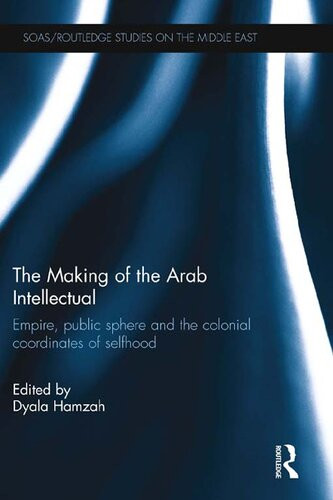

Most ebook files are in PDF format, so you can easily read them using various software such as Foxit Reader or directly on the Google Chrome browser.
Some ebook files are released by publishers in other formats such as .awz, .mobi, .epub, .fb2, etc. You may need to install specific software to read these formats on mobile/PC, such as Calibre.
Please read the tutorial at this link. https://ebooknice.com/page/post?id=faq
We offer FREE conversion to the popular formats you request; however, this may take some time. Therefore, right after payment, please email us, and we will try to provide the service as quickly as possible.
For some exceptional file formats or broken links (if any), please refrain from opening any disputes. Instead, email us first, and we will try to assist within a maximum of 6 hours.
EbookNice Team

Status:
Available0.0
0 reviews
ISBN 10: 0203080475
ISBN 13: 9780203080474
Author: Dyala Hamzah
In the wake of the Ottoman Empire’s nineteenth-century reforms, as guilds waned and new professions emerged, the scholarly ‘estate’ underwent social differentiation. Some found employment in the state’s new institutions as translators, teachers and editors, whilst others resisted civil servant status. Gradually, the scholar morphed into the public writer. Despite his fledgling status, he catered for the public interest all the more so since new professionals such as doctors, engineers and lawyers endorsed this latest social role as an integral part of their own self-image. This dual preoccupation with self-definition and all things public is the central concern of this book. Focusing on the period after the tax-farming scholar took the bow and before the alienated intellectual prevailed on the contemporary Arab cultural scene, it situates the making of the Arab intellectual within the dysfunctional space of competing states’ interests known as the ‘Nahda’. Located between Empire and Colony, the emerging Arab public sphere was a space of over- and under-regulation, hindering accountability and upsetting allegiances. The communities that Arab intellectuals imagined, including the Pan-Islamic, Pan-Arab and socialist sat astride many a polity and never became contained by post-colonial states. Examining a range of canonical and less canonical authors, this interdisciplinary approach to The Making of the Modern Arab Intellectual will be of interest to students and scholars of the Middle East, history, political science, comparative literature and philosophy.
1 Introduction: the making of the Arab intellectual (1880–1960): empire, public sphere and the colonial coordinates of selfhood
Arabic thought in the colonizing age: of historiography and paradigms
The sequence of articles and rationale of the volume
Notes
2 Pharaoh's revenge: translation, literary history and colonial ambivalence
Translation and literary history
Translation, genre and the literary Nahḍa in Egypt
Edwardian anxieties and colonial concerns: ‘imperial gothic' and ancient Egypt
The translator strikes back: Pharos the Egyptian and the degenerate city
Notes
3 Public deliberations of the self in fin-de siècle Egypt
Fallāḥīn as Egyptians
Fallāḥ and Muzāriʽ
Scientific agriculture, productivity and collective duty
Conclusion
Notes
4 Inscribing socialism into the Nahḍa al-Muqtataf, al-Hilāl, and the construction of a Leftist reformist worldview, 1880–19141
Introduction
The Nahḍa or the mantra of reform
Discursive authority and the making of a new class
Covering the left: al-Muqtaṭaf and al-Hilāl's articles on socialism
From reform to socialism and back: domesticating socialism, radicalizing the Nahḍa
A specific and influential example: Shiblī Shumayyil's writings on socialism
The role of diaspora readership in the coverage of socialism and anarchism
Contestation and diasporas
Conclusion
Appendix
al-Muqtaṭaf
al-Hilāl
Notes
5 From ‘ilm to Ṣiḥāfa or the politics of the public interest (maṣlaḥa): Muḥammad Rashīd Riḍā and his journal al-Manār (1898–1935)*
Muḥammad Rashīd Riḍā: scholar, reformer or journalist?
Teleology vs. history or the reformer reconstructed
Reformer by analogy or journalist by profession
A scholar by training
A tale of two Nahḍas
Neither Azharī nor Afandī
From ʽilm to ṣiḥāfa
Fellowship, (networks) and journalism
Publicizing the public interest (I): a complex genealogy
Equating iṣlāḥ and maṣlaḥa
Publicizing the public interest (II): the salafi turn
Maṣlaḥa left, right, and centre (or: diachronic, synchronic and periodic readings compared)
Setting the stage: maṣlaḥa as the end of deliberation (muḥāwara) and consultation (shūrā)
Ṭūfī or Riḍā's mediated appropriation of tradition
Shātibī or Riḍā's editing of tradition
By way of conclusion
Notes
6 Partitioned pasts: Arab Jewish intellectuals and the case of Esther Azharī Moyal (1873–1948)1
Arab Jews and historiographies of modernity
Arab Jewish intellectuals in the Nahḍa
Esther and Shimʻon Moyal: Levantine intellectual journeys
An enlightenment devotee
Arab feminism
The Dreyfus affair
“Sephardi Zionism,” Ottomanism, and Easternism
The partitioning of history
Notes
7 The Mahjar as literary and political territory in the first decades of the twentieth century: the example of Amīn Rīḥānī (1876–1940)
At the turn of the century, entering modernity in Arabic
The portrait of Amīn
Provoking old Lebanon
Choosing an identity between divinities and nationalism
The Mahjar: an intellectual network
Amīn on the move
Word threads: correspondence and meetings
Exiles and the nation's inventions
War
Creating symbols for the homeland
Conclusion
Notes
8 The generation of broad expectations: nationalism, education, and autobiography in Syria and Lebanon, 1930–19581
The educational situation
Education and social background
The experience of education
Nationalism and the framework of an ‘intellectual habitus'
Conclusion
Notes
9 Waiting for the Superman: a new generation of Arab nationalists in 1930s Iraq
Generational awareness
ʽAbd-al-Amīr ʽAlāwī
Muḥammad Mahdī Kubba 20
ʽAlī Maḥmūd al-Shaykh ʽAlī
Ṭālib Mushtāq
Rufāʾīl Buṭṭī and Yūnus al-Sabʽāwī
The Muthannā Club
Ideology
Anwar Shāʾkl: a Jewish voice
Conclusion
Notes
Bibliography
the making of the arab intellectual
the making of an arab empire
the arab mind pdf
the arab israeli conflict book
x the book
Tags: Dyala Hamzah, Arab, intellectual